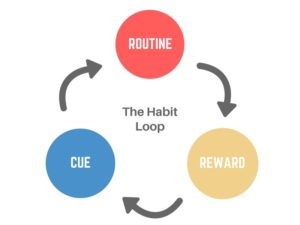A few weeks ago I decided to take the Harley Davidson Riders Edge Skills course to obtain my Motorcycle license. I took the course in high school and had to pass it in order to take the permit test. Since I never obtained my license after having my temps and haven’t ridden a bike in a while I decided to take the course yet again.
Going in I already felt confident and prepared. While practicing the skills I was executing them well until the test came. WOW was I nervous! I’m not sure why and where it came from but it hit me hard. I felt my heart racing and my mind became clouded with negative thoughts of, “You can’t do this. What if I fail? Don’t mess this up.”
I was a nervous wreck. At one point I checked my Fitbit and my heart rate was well in the 100s – not good!
As a mental coach I assist athletes and performers to regulate their emotions, so you’d think that I would be able to control my own, right? That’s what I thought. I quickly used some of the skills I had in my mental toolbox such as deep breathing exercises and started to talk to myself instead of listening to the negativity storm that was brewing. I reminded myself that I have taken this test before and crushed it, it’s not a big deal, just go out and show them what you can do.
Well, my nerves got the best of me. I doubted my abilities and made several errors that I was not making earlier. With each mistake, I became more frustrated with myself. I was experiencing what many athletes and performers do when they choke during a performance. My attention shifted to overthinking even the most simple tasks and skills instead of allowing myself to simply perform them as I have before.
By the end of the test, I was emotionally worn out. I knew I blew it. I let my emotions and nerves take over and control me instead of being in control of them.
When it was my turn to check in with how I did I felt the tears coming and the emotions swelling up. I didn’t pass.
I was upset and frustrated. I was so angry with myself. Here I am, a MENTAL PERFORMANCE COACH and I can’t even keep my mentality and emotions in check for a motorcycle road test. I started to doubt my ability to be a mental coach. If I can’t apply the skills myself, how could I even teach them to others?
I held on to this failure for a couple of days and continued to feel humiliated. I didn’t tell anyone that I failed and luckily not a lot of people asked about it. I got questions such as, “How did the class go?”
I would respond with, “It was good! So much fun,” not addressing whether or not I passed. Most of my family just assumed I passed so when they asked when I was going to start riding I would say, “I’m not sure, I still have to go to the DMV and get a new license.”
I made excuses for myself over and over again. After sulking for a few days I knew I had to change my mindset, perspective, and attitude. My boyfriend Cody was great at not letting me give up. He complimented me several times about how impressed he was with my skills and that if I took it again I would definitely pass. He reminded me that I knew the skills and drills, I just wasn’t able to execute them at that moment. He encouraged and pushed me to try again.
I had the opportunity to re-do the test which would be in a one-on-one setting to really improve my skills. After about a week or two I was ready to schedule the test and try again.
I still felt embarrassed when I returned for the test but forced myself to embrace feeling uncomfortable to meet my goals. I had to continue to remind myself that passing or failing does NOT define who I am as a person, mental coach, or anything else for that matter. I needed to take the pressure off of myself and enjoy being out on the bike developing my riding skills.
When I was struggling with one of the skills the instructor came up to me and asked what I do for work. When I told her about being a mental coach for athletes she asked, “Alright then. Imagine that you’re the mental coach for an athlete who is in your position. What would you tell them?”
I thought about it. I knew exactly what I would tell them, “Get out of your own head. Focus on the skill you need to execute and follow the steps.”
“Exactly!” the instructor beamed. “Now tell yourself that and do it.”
My motivation and determination grew. I knew I could do it, I just had to break the task down, focus on what I needed to do, and get it done. I started to smile and laugh when I would mess up because I knew exactly how to correct it and focused more on the ones I was doing successfully.
Being able to laugh at yourself through mistakes is HUGE. Mistakes happen, big deal. Get over it, laugh at yourself, and move on. Learn from it and try again. I took this approach throughout the test and felt much more comfortable and confident. I realized that even if I failed, yes I would be upset with myself, but it’s not the end of the world.
I passed the second time around. I knew I could do it, I just had to prove I could do it during the test when the pressure was on.
Isn’t this how life is though? So many times throughout life we KNOW what to do and we KNOW how to do it, but when the pressure is on our emotions get the best of us and we fall hard. This doesn’t have to define us though!
Failing the test the first time was actually a humbling experience. It taught me these 7 things:
1. Learn to laugh at yourself – It’s easy to become upset and frustrated but if you continue holding onto these feelings you will not improve, you’ll only fall harder. Learn to laugh at yourself because it will relieve stress and help you to refocus.
2. Learn from mistakes/errors – Fail means First Attempt In Learning so learn from your errors and apply it your second time around. You’ll be amazed at your progress if you use mistakes as teachable moments rather than a reason to beat yourself up.
3. Get back up – If you fail at something, don’t give up! You have goals for a reason, no one said it would be easy. Overcome your mistakes by being determined to continue.
4. Focus on the task at hand – You know what to do. Instead of overthinking the task or considering worst-case scenarios, take a deep breath and break the task down simply. Your body knows what to do so instruct it to follow through and it will.
5. Take the pressure off – We are the ones who put the pressure on ourselves. We are also the ones who can take it off. Look at the bigger picture. In the grand scheme of life does this one moment really define your whole future? Chances are it doesn’t. Whether you fail or succeed you will continue living and moving forward.
6. Failure doesn’t define you – You define who you are, not others. This goes along with taking off the pressure. If we can understand that failing won’t ruin us then it takes the pressure off as well. Remind yourself of all the hard work and effort you put in. This is what defines you, not the outcome.
7. Have fun – When we put the pressure on ourselves we forget to have fun. We become tense and have clouded minds. Relax. Breathe. Remind yourself what you find fun about what you’re doing. Smile and enjoy the moment.
———–
This experience reminded me that even if we have all of the tools in our disposable for how to handle pressure, the pressure can still get to us and cause us to perform less than we know we can. Mental skills are not something you learn and then BOOM all your problems and stresses are gone and solved. It takes constant work and constant practice. Some days you’ll nail it, other days you won’t. It doesn’t mean we should stop trying!
Next time you engage in an activity or performance and the nerves start to bubble up, show yourself some self-love and understanding. It’s normal. Even if you KNOW what you should do and KNOW the skills to execute it can still happen to you. Even someone with a Master’s degree in Sport and Exercise Psychology can become flustered and feel pressure to the point where they can’t even pass a motorcycle test on skills that they’ve executed before.
Some days you win, some days you don’t. What matters most is how you perceive and respond to the failures. Get back up, dust yourself off, and tackle it again. Remind yourself of the 7 things that I learned during my experience and use them to make your setback a comeback!

Maybe I’ll see you on the road, I’ll be the one with the purple butterfly motorcycle helmet 😉






